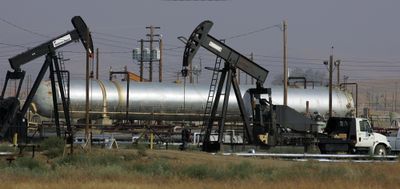Flush with cash, Big Oil ready for a buying spree

HOUSTON – Big Oil is set to spend billions on new exploration in 2009, but in addition to ocean beds thousands of feet below the water’s surface, major producers are surveying the balance sheets of vulnerable companies in the sector.
Major oil companies are sitting on enormous piles of cash after posting record profits in recent quarters, while crumbling stock and crude prices have made many smaller oil and gas companies potential targets.
The disparity in the energy sector comes as Exxon Mobil Corp., BP PLC and other oil giants find it increasingly difficult to secure new sources of fossil fuels the old-fashioned way – exploring and drilling for them.
Smaller producers that don’t have the same massive capital reserves have been stung by a credit crisis that’s severely limited or even paralyzed their ability to finance new exploration and production.
“You have a lot of smaller producers with a lot of property, but many are constrained right now,” said Brian Youngberg, an energy analyst at Edward Jones. “Then you have the major integrated companies with deep pockets that could potentially buy these reserves at relatively attractive prices. You’re probably going to see this happen as we move through 2009.”
In the long run, consumers could benefit if the deep-pocketed majors step in and finish some projects that might otherwise go undeveloped by smaller, struggling producers. Increased production puts downward pressure on prices.
No one predicts the mega-deals of the late 1990s, when oil fell to near $10 a barrel and the couplings included Exxon and Mobil, and BP and Amoco, creating today’s behemoths. But observers say consolidation is inevitable given the enormous stockpiles of capital at the ready, paired with the bargain prices for some companies.
Exxon Mobil, the world’s largest publicly traded oil company, said recently it has $37 billion in cash.
At the same time, the economic downturn and a significant drop in commodity prices have erased huge chunks of market value for other energy companies, including independent oil and natural gas producers with rights to potentially oil-rich tracts of land and sea.
Independents concentrate solely on exploration and production, forgoing refining and marketing operations. Among those mentioned by analysts as possibly appealing to larger rivals are Apache Corp., Devon Energy Corp. and Chesapeake Energy Corp.
Chesapeake, the largest U.S. natural gas producer, has been rumored as a takeover target of BP – speculation possibly fueled by BP taking an interest in certain Chesapeake ventures in the past few months.
Youngberg and other analysts say the oil giants are likely to proceed cautiously given the uncertain economic times and potential for a prolonged recession that has already slashed energy demand.
For now, there’s plenty of money in the coffers for big oil.
Exxon Mobil, BP and rivals Chevron Corp., Royal Dutch Shell PLC and ConocoPhillips posted combined earnings of $44.4 billion in the most-recent quarter, up 58 percent from the same three-month period a year earlier. The biggest reason was oil prices that soared to a record above $147 per barrel in July and remained above $100 when the third quarter ended Sept. 30.
Since the July record, prices have tumbled about 60 percent.
In a recent research report titled “Big Oil Should Step on the Gas,” Credit Suisse energy analyst Mark Flannery noted the majors’ ongoing challenges finding new, substantive supplies of oil and gas.
Even though most people recognize the names of the giant multinationals – Exxon Mobil, Shell, BP and others – they control less than 10 percent of the world’s oil reserves. Most proven reserves – about 80 percent – are held by national, state-run companies like those in Venezuela and Saudi Arabia.
Exxon Mobil may be the world’s largest investor-owned oil company, but it produces only about 3 percent of the world’s crude.
The majority of crude and natural gas is supplied by smaller, independent companies.
Altogether, the nation’s roughly 5,000 independent operators account for 68 percent of oil and 82 percent of the natural gas produced in the U.S., according to the Independent Petroleum Association of America.
In the past, Big Oil has shown restraint on potential buying sprees, even when flush with cash.
In fact, Exxon, BP, Chevron, Shell and ConocoPhillips plowed about 55 percent of the cash they made from their businesses into stock buybacks and dividends last year, according to Rice University’s James A. Baker III Institute for Public Policy.
The percentage they’ve spent on acquisitions, meanwhile, has remained flat for the past several years, in the low-single digits.
And the industry’s integrated giants aren’t the only ones looking for bargains that might complement their operations.
Large independent Occidental Petroleum Co. has acknowledged it’s been shopping in the past couple of months – and even made offers – but hasn’t struck any deals.